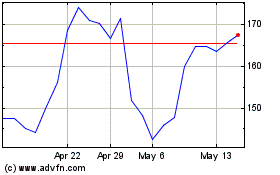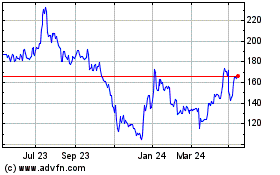Today's Top Supply Chain and Logistics News From WSJ
March 22 2017 - 7:06AM
Dow Jones News
By Paul Page
Sign up:With one click, get this newsletter delivered to your
inbox.
Concerns over price-fixing in shipping are spreading just as
global container lines are preparing to line up in powerful new
alliances. The U.S. Justice Department effectively disclosed an
investigation into the liner companies, the WSJ's Costas Paris
reports, by crashing a meeting of top industry executives and
issued subpoenas to companies including Maersk Line, a unit of
Danish conglomerate A.P. Moller Maersk A/S and Germany's
Hapag-Lloyd AG. The probe comes as carriers are undertaking big
changes following a crushing downturn, consolidating businesses
while exerting new discipline on operations and pricing. They're
also resetting operations this spring under three big alliances
that will divide an enormous share of containerized goods on major
trade lanes. The shipping lines are seeing freight rates rise at a
substantial pace off last year's historic lows, increases carriers
say are the result of tight capacity. Recent probes in the
automobile-shipping and airfreight business suggest investigators
won't easily let go of questions over collusion, however.
When the owners of a shoe factory at the heart of China's
industrial base starts looking for lower-cost operations in the
U.S., it's clear that big shifts are underway in global
manufacturing. The scouting by Dongguan Winwin Industrial, which
makes high-quality sneakers and casual shoes for big American
companies, is part of a trend that began long before Donald Trump's
angry election rhetoric highlighted China's manufacturing power,
the WSJ's Andrew Browne reports. The exit of U.S. factory jobs from
the country is roughly matched by posts coming in, according to the
nonprofit Reshoring Initiative, a response to changes in
supply-chain economics, including rising wages and taxes in China
and the costly, slow shipping path to market. Lower real-estate and
energy costs in the U.S. add to the new calculations, but the
biggest change is on the factory floor. Manufacturing executives
say new automation helps defray labor costs, changing the formula
for measuring factories in China against those in the U.S.
FedEx Corp. insists its investment in ground operations will pay
off in coming years , but the business is weighing on earnings
growth this year. The express giant reported a $562 million net
profit in the third quarter as revenue jumped 18% to $15 billion,
the WSJ's Maria Armental reports. But FedEx also cut its projected
earnings for the current fiscal year as it copes with the costs of
integrating its TNT Express acquisition and of adjusting to more
expensive e-commerce deliveries. Those distribution costs helped
pull down profit margins at the express and ground divisions in a
quarter that included peak-season holiday shipping. FedEx even lost
some residential delivery business to what it calls its own "yield
management actions." That means the company insisted on higher
prices, a strategy FedEx is likely to maintain until its
investments make online deliveries cheaper and easier to
deliver.
SUPPLY CHAIN STRATEGIES
The logistics real-estate market may be due for a big upheaval.
Blackstone Group LP is gearing up to unload its European warehouse
property arm, the WSJ's Art Patnaude reports, in a sale that comes
as Global Logistic Properties Ltd. prepares to sell its own set of
logistics sites around the world. Blackstone, the U.S.
private-equity giant, has been working simultaneously toward a sale
or initial public offering for Logicor, which it created in 2012 to
operate industrial properties across Europe. The sales signal a
global shift in ownership of logistics properties as the strong
expansion of e-commerce is boosting the value of logistics sites
and upending entrenched patterns of distribution. Experts believe a
Blackstone sale could surpass $10 billion. One question hanging
over any sale is how the Blackstone sites will fit into a
distribution landscape that may change as online shopping grows and
the U.K. exits the European Union.
QUOTABLE
IN OTHER NEWS
A bankruptcy judge approved a reorganization plan to bring
Ultrapetrol (Bahamas) Ltd., owner of one of the largest cargo
fleets in South America, out of chapter 11. (WSJ)
The U.S. and Britain banned passengers from carrying most large
electronics in the cabin on flights from a handful of countries in
the Middle East and North Africa. (WSJ)
The dollar fell to its lowest level in more than four months.
(WSJ)
Copper prices are falling on hopes that supply disruptions in
Chile and Indonesia could be ending. (WSJ)
European Union leaders will meet April 29 to agree on guidelines
for Brexit negotiations with Britain. (WSJ)
U. K. consumer prices rose at their fastest pace in nearly 3 1/2
years in February. (WSJ)
European Union and Japan's leaders vow to fast-track talks on a
trade deal aimed at boosting exports and countering U.S.
protectionism. (WSJ)
General Mills Inc.'s fiscal third-quarter sales in North America
fell 7% from a year ago. (WSJ)
Wal-Mart Stores Inc. is starting an internal venture called
Store No. 8 meant to incubate new online retail businesses. ( New
York Times)
Amazon.com Inc is expanding a program to remove counterfeit
goods from its website. (Reuters)
Taiwan Semiconductor Manufacturing Co. is considering placing a
multibillion-dollar microchip fabrication plant in the U.S.
(Bloomberg)
App-based grocery delivery service Shipt is rolling out Costco
Wholesale Corp. home delivery in Tampa, Fla. (Business
Journals)
The Saint Lawrence Seaway navigation season opened at the St.
Lambert Lock in Montreal. (MarineLink)
The New York Shipping Exchange, which aims to provide a platform
to set contracts for future ocean shipping, gained $8.5 million in
funding. (American Shipper)
The American Trucking Associations truck tonnage index fell 2.6%
from January to February. (Logistics Management)
Whole Foods Market Inc. adopted new sourcing guidelines for tuna
in the grocer's prepared foods department. (MarketWatch)
Chinese imports of U.S. lobsters are soaring. (WBZ)
ABOUT US
Paul Page is deputy editor of WSJ Logistics Report. Follow him
at @PaulPage, and follow the entire WSJ Logistics Report team:
@brianjbaskin, @jensmithWSJ and @EEPhillips_WSJ and follow the WSJ
Logistics Report on Twitter at @WSJLogistics.
Subscribe to this email newsletter by clicking here:
http://on.wsj.com/Logisticsnewsletter .
Write to Paul Page at paul.page@wsj.com
(END) Dow Jones Newswires
March 22, 2017 06:51 ET (10:51 GMT)
Copyright (c) 2017 Dow Jones & Company, Inc.
Hapag-Lloyd (TG:HLAG)
Historical Stock Chart
From Mar 2024 to Apr 2024

Hapag-Lloyd (TG:HLAG)
Historical Stock Chart
From Apr 2023 to Apr 2024
